Highlights
A warm, welcoming reading room and celebrated architectural landmark that houses one of the largest collections of literary recordings in the U.S.
- Designed by Alvar Aalto
- 8,000 collections of poetry
- 6,000 literary recordings
- 150 open-shelf magazines
Our Spring 2026 season of events is dedicated to the memory of beloved poet, friend, mentor, and activist Fanny Howe (1940-2025). Her presence will be profoundly missed at our events, but her spirit of ceaseless exploration--and her quest to shine a light on oppression in all its forms--will live on in her writings and in this community, which she (through her curiosity and care) transformed. We will be posting more Spring events shortly, including a Wax Poetics featuring Ishion Hutchinson on Kamau Brathwaite on March 12th and a Reading by Susan Howe on April 3rd. All Poetry Room events are free and open to the public.
Please note: Due to our on-going work on a Mellon Public Knowledge grant, we will be reducing our programs during this academic year, but our hours and our commitment to our community remain the same. We welcome you to visit the Poetry Room as a sanctuary of calm, compassion, and inclusion.
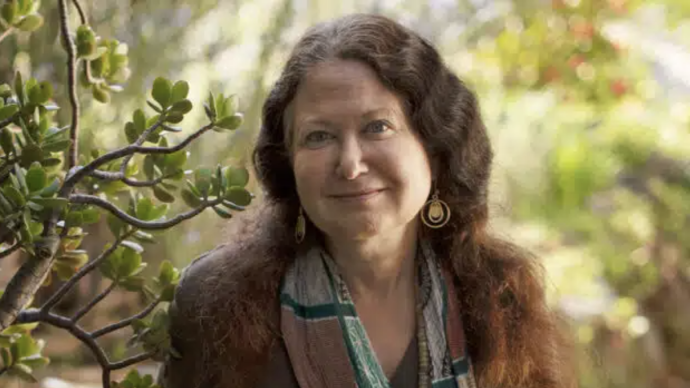
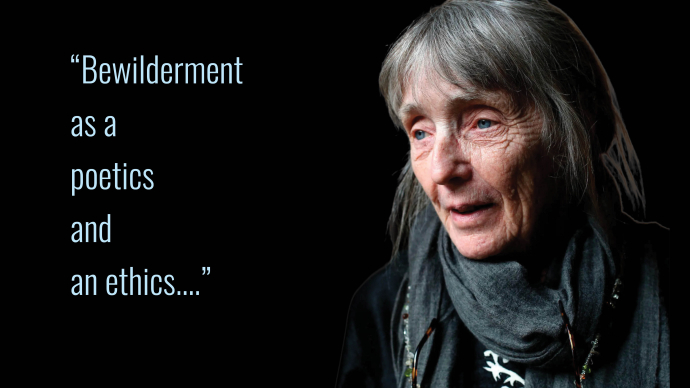
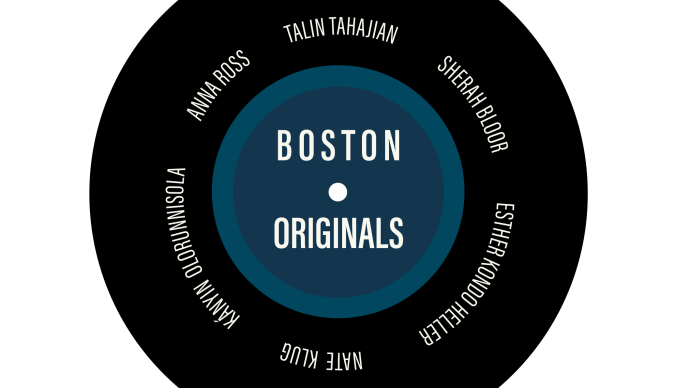
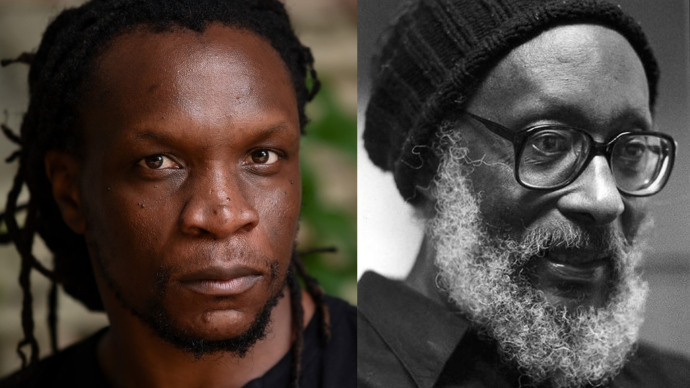
Ashbery Typewriter Sessions
Celebrate the generous & generative spirit of John Ashbery (1927-2017) by creating poems on his typewriter. Our Fall 2025 sessions will take place on OCTOBER 1, NOVEMBER 5, and DECEMBER 3 from 1:00-5:00pm. Reservations are required. Faculty members and local educators are welcome to contact us regarding class-related use throughout the semester.
Collections
The Woodberry Poetry Room is home to a breathtaking range of poetry-related collections: including a landmark collection of literary recordings (1933 to the present) and a browsable selection of 20th and 21st century poetry monographs and magazines (which can be accessed at its Lamont Library location). It is also the repository of a wide array of rare books, broadsides, and typescripts (which can be accessed via Houghton Library).
Please note: The Poetry Room is not the library of record for poetry at Harvard: for that, we commend you to Harvard Library's wonderful flagship location, Widener Library.
Classes & Tours
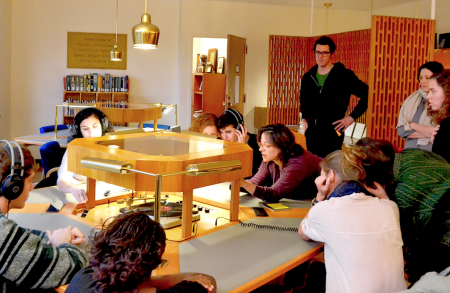
The Woodberry Poetry Room offers a range of innovative educational opportunities, including staff-led audio seminars, public listening sessions, and group tours.
In addition to our standard seminar, which gives a broad overview of our A/V collection highlights and history, we are happy to customize seminars for individual classroom needs.
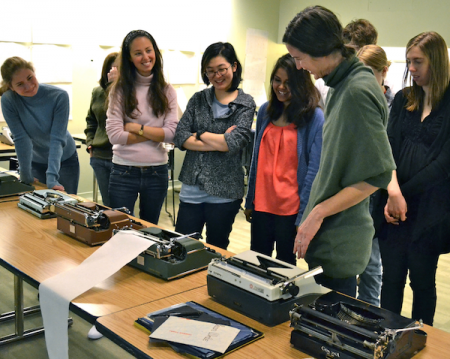
Faculty members, graduate students, and local educators wishing to schedule classes or seminars in the room are encouraged to use the Special Collections Class Request tool. The Woodberry Poetry Room curatorial staff will follow-up to discuss your specific needs and interests.
If you would like to schedule a group tour or to discuss a more formal use of the venue, please contact us in advance to make arrangements.
Creative Fellowships
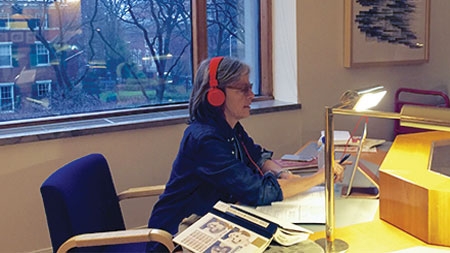
Each year the Woodberry Poetry Room offers poets, writers, visual and multimedia artists, and scholars of contemporary poetry the opportunity to apply for the WPR Creative Fellowship.
Applicants are encouraged to propose creative projects that would benefit from the resources available in the room and to generate new work that further actualizes the Poetry Room's collections—particularly the audio-video archive.
The next deadline is March 1, 2026. Recipients will be notified by August 15, 2026.
To apply, please visit our Submittable page. (Please note: the new application will not go live until February 1, 2026).
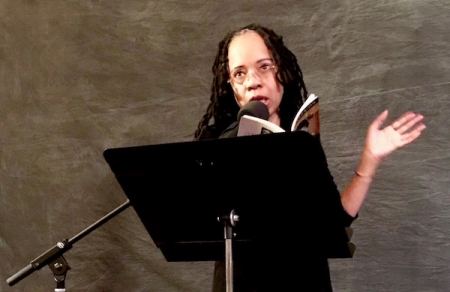
The recipient of the 2024-2025 WPR Creative Fellowship was Fiona Templeton for her project "Songs Between Worlds."
Each year, the committee is also given the option to name a Creative Grant recipient: the 2023-2024 recipient was Maia Tserediani and Ryan Sherman for their project "From Tbilisi to Woodberry: Translating the Order of the Blue Horns."
Past fellowship recipients have included Rosa Alcalá, Jonah Mixon-Webster, Diana Khoi Nguyen & Jane Wong, Tracie Morris, Erin Moure, Eileen Myles, Sawako Nakayasu, and Fanny Howe. WPR Creative Fellowships and Grants are generously funded by the Anagnostopoulos fund.
About the Poetry Room
Welcome to the Woodberry Poetry Room, a special collections reading room and lively literary center at Harvard University.
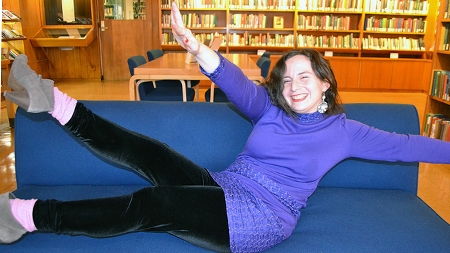
Located in Lamont Library — in a room designed by Alvar Aalto — and overseen by Houghton Library, the Poetry Room features over 5,000 poetry monographs and magazines and a landmark collection of literary recordings (1933-present).
With over 6,000 recordings on a range of media that span the 20th and 21st centuries — including discs, magnetic tape (reel to reel and cassette), CDs, DATs, and born digital — the collection is one of the largest and earliest literary sound archives in the United States.
BRIEF HISTORY OF "THE LIBRARY OF VOICES"
Woodberry at Widener: 1931—1949
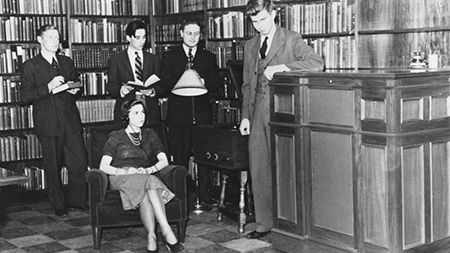
Founded in honor of poet, scholar, and Harvard graduate George Edward Woodberry (1855-1930), the Poetry Room first opened its doors on the third floor of Widener Library in 1931. Prof. Harry Levin later reflected that its opening was a kind of declaration that "Harvard was officially recognizing modern poetry."
The early Poetry Room featured seminal materials from the Amy Lowell collection, now a part of Houghton Library, as well as Modernist monographs and magazines. The Morris Gray lecture series — which hosted such luminaries as Martha Dickinson Bianchi, Robert Frost, Wallace Stevens, and William Carlos Williams — added an audible dimension to the room. In 1938, a Victrola was installed, and phonograph records swiftly became the fulcrum of the room and its collections.
The Harvard Vocarium: 1933—1955
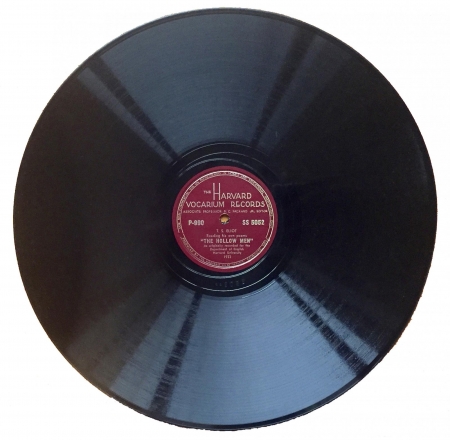
The mere presence of phonograph records does not explain how the Poetry Room became a landmark A/V collection. For that, we need to turn to the pioneering work of Harvard Professor of Public Speaking Frederick C. Packard, Jr..
As early as 1929, Packard began to clamor for the creation of the world's first-ever library of voices (a "vocarium," as he and Prof. E. K. Rand dubbed it), which would be “a place where voices can be kept and studied” and stand in equal stature to a library of books. He found a home for his vision in the nascent Poetry Room: “My Vocarium was in there.”
In 1933, Packard launched the Harvard Vocarium, one of the first poetry and spoken-literature recording labels in the world. The preliminary batch featured several Latin and Greek recordings and T. S. Eliot's first poetry recording. Eliot's recording of "Gerontion" and "The Hollow Men" was made by Packard during the poet's year-long Charles Eliot Norton lecturership.
Until its discontinuation in 1955, the Harvard Vocarium made and, in many cases commercially released, the first (or earliest extant) recordings by such authors as Elizabeth Bishop, Robert Lowell, Marianne Moore, Vladimir Nabokov, Anais Nin, Ezra Pound, and Tennessee Williams. While a 1938 Boston Sunday Post article boasted that “Harvard University, one of the most forward universities in the world, is breaking all precedent and founding a library for the voice,” the vast library (encompassing poetry readings, theatrical performances, musical concerts, classical oratory, and political speeches) that Packard envisioned never wholly materialized. But his literary recordings did continue to be deposited, preserved, and accessed at the Woodberry Poetry Room, where an active effort to catalog and preserve them continues to this day.
The Poetry Room in Lamont Library: 1949—present
By the late 1940s, the venue had become so popular that plans were made to move it to the new Lamont Library.
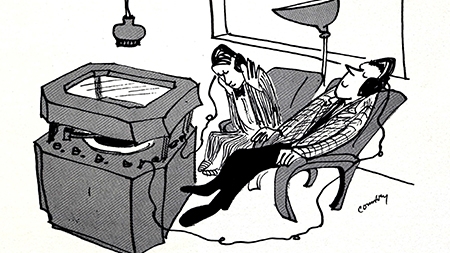
When the Poetry Room opened in Lamont in 1949, it was in a new suite of Alvar Aalto-designed rooms created specifically as "a place for poetry" and poetry listening. Four Thorens turntables, equipped with outlets for eight sets of earphones, helped to accommodate the growing visitorship. Over 4,000 listening requests were made during its first four months alone.
(The downside of this move was that it excluded women from the Poetry Room: Radcliffe students had previously had access to its Widener venue. With the exception of summer sessions, during which time such poets as Adrienne Rich and Sylvia Plath were able to visit, Lamont Library did not admit women until 1967.)
During John Lincoln Sweeney’s mid-century curatorship, the Poetry Room flourished and became a nexus for poets who were (or would later be) associated with the New York School of Poets, the Boston Renaissance, and the so-called "Confessional" poetry movement. The Poetry Room also forged a significant collaboration "The Poet Speaks" with the British Council, which jointly funded recordings by Kamau Brathwaite, Philip Larkin, Hugh MacDiarmid, Stevie Smith, Ted Hughes, among others.
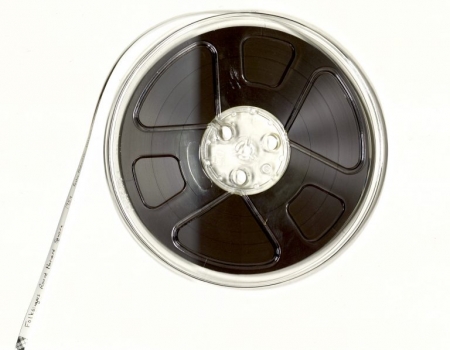
Working in collaboration with Packard and with the expertise of sound engineer Stephen B. Fassett, Sweeney was responsible for documenting the circuit tours of E. E. Cummings and Dylan Thomas, for making Wallace Stevens' last recordings, and for chronicling the performances of such emerging mid-century writers as John Ashbery, John Berryman, Robert Creeley, Allen Ginsberg, Stephen Jonas, Robert Lowell, Sylvia Plath, Adrienne Rich, Anne Sexton, and John Wieners.
Sweeney also facilitated and recorded literary conferences and folk-music performances in Lamont Forum Room: among the highlights from this collection are one of the earliest live recordings of Ralph Ellison, made during the Conference on the Contemporary Novel, in August 1953.
Fassett continued to assist interim curators after Sweeney's tenure: in addition to his early work recording everyone from Baez to Plath, Fassett was instrumental in making Poetry Room recordings by Audre Lorde and Yvegeny Yevtushenko.
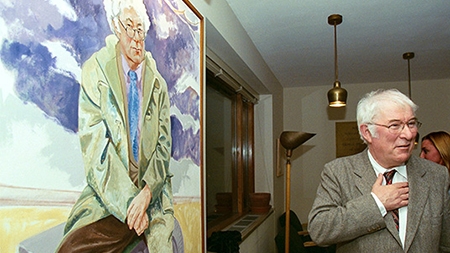
In 1974, Stratis Haviaras was named curator of the Poetry and Farnsworth Rooms, a position he held until 2000. During this lively period, Haviaras recorded a wide array of poets representing a broad range of late 20th century poetics: among them, Charles Bernstein, Rita Dove, Robert Duncan, Jorie Graham, Galway Kinnell, Sharon Olds, Gary Snyder, and Derek Walcott. Haviaras was also responsible for creating a substantive archive of Greek-language recordings, featuring such authors as George Seferis and Odysseus Elytis.
In addition, he recorded over 40 readings, seminars, and lectures by Seamus Heaney, during Heaney's pivotal period of affiliation with the university. Like Sweeney before him, Haviaras also began to transfer the Poetry Room's recordings to the next iteration of sound recording: the compact cassette.
In 1986, Haviaras founded the literary journal Errato, which later became the Harvard Review--contributors to which have included Jhumpa Lahiri, J. M. Coetzee, Yusef Komunyakaa, David Foster Wallace, and the over 200 poets who participated in the recent Renga for Obama.
The Poetry Room Joins Houghton Library: circa 2000
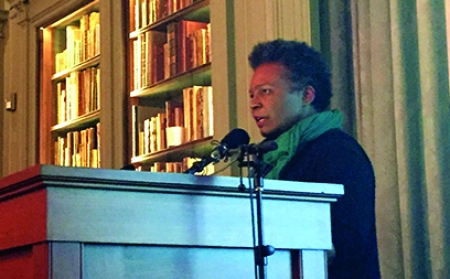
With Haviaras’ retirement in 2000, the Poetry Room was transferred to management under Houghton Library: its landmark recording collection having been deemed a special collection.
In 2002, during the dynamic curatorship of Don Share, the Harvard Vocarium was chosen by the Library of Congress as a part of the first annual selection of the National Recording Registry.
Share was also crucial in recognizing the precarity of early recording formats and helped pilot the first Library Digitization Initiative at Harvard, establishing new standards for audio preservation. In 2006, Share joined the staff of Poetry Magazine.
The Poetry Room has a long history of hiring poets and writers, and the current staff is no exception to that legacy. Christina Davis and Mary Walker Graham are both actively publishing poets. Past curatorial assistants and Harvard students who have worked at the Poetry Room include: Chloe Garcia Roberts, Maureen McLane, Fred Moten, and Lindsay Turner.
Poetry Room curators from 1931 to the present have been: W. N. Bates, George M. Kahrl, Arthur T. Hamlin, Arnold M. Kenseth, Philip Horton, John Lincoln Sweeney, Robert Fitzgerald, Jeanne Broburg, Stratis Haviaras, Don Share, and Christina Davis.
The Woodberry Poetry Room's A/V collection is, according to Nobel laureate Seamus Heaney, "indispensable: it contains not only the voices—from different times of their lives—of the greatest poets, but constitutes a living history of modern poetry." This vital tradition continues today with a rich assortment of readings and performances, as well as significant efforts to preserve and digitize the Poetry Room’s pivotal recordings for generations to come.
Accessibility of the Poetry Room
- The main entrance to Lamont Library near Quincy Street is accessible by automatic door and ramp.
- The Poetry Room is on the 3rd floor and can be accessed by elevator.
- Attendees to Poetry Room events may request accommodations with advance notice.
- An all-gender restroom on the 4th floor is open Monday-Friday, 9AM-5PM during the academic term.
We encourage anyone with accessibility questions about the Woodberry Poetry Room to contact Houghton Library.